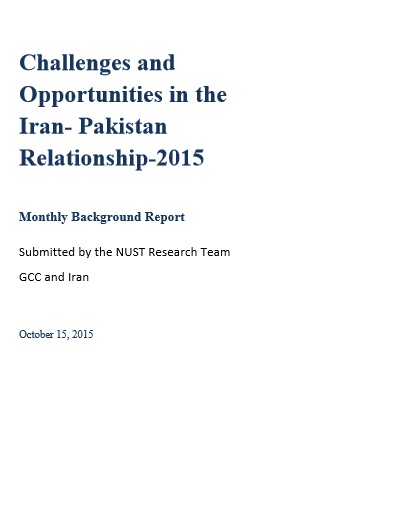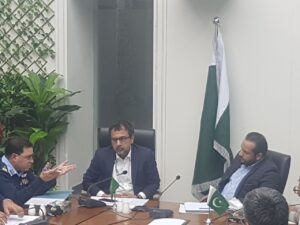There are considerable amount of challenges which needed to be surmounted in order for the Iranian-Pakistan relationship to blossom. Historically, the relationship has been defined in terms of a divergence of alliances and national interests instead of strategic convergence despite shared historical and cultural values between both nations.
Iran was one of the first states to recognize the sovereign status of Pakistan in 1947 and simultaneously, Pakistan became one of the first states recognize the Islamic Regime in Iran after the 1979 revolution[1]. The subsequent turmoil in Pakistan due to military coups as well as the fragility of democracy has had a bearing on the relationship where different governments have aligned itself with the Iranian regime. The relationship has also been held hostage to Pakistan’s alliance with the United States and Saudi Arabia as opposed to Iran, which had chosen not to ally itself with the West after the revolution, Hence, differing narratives on the status of Afghanistan during the 1979 war, to close economic and defense cooperation between Pakistan and Saudi Arabia.
Due to the complications of this relationship it is imperative to examine the everlasting challenges which both states encounter which hinder their ability to cooperate bilaterally. An examination of recent history would aid that process, where opportunities and challenges can be examined and explored so that adequate policy recommendations can be formulated to deal with those challenges and cash in on those opportunities.
Analysis of the Issue:
Recent history has suggested that prospects for cooperation have been promising, despite the civil/ military conundrums in Pakistan and the Iranian regime’s reservations over Pakistan’s alliance with the United States and Saudi Arabia, which Iran views with skepticism and suspicion. The relationship with Iran during the Shah regime for example, focused primarily on the convergence of strategic interests where both states were founding members of CENTO or the Baghdad Pact which was formed in 1955[2]. Trilateral initiatives have also included regional forums such as the RCD or the Regional Cooperation of Development which was established in 1964.
After the Shah regime was deposed and the 1979 Islamic revolution took place, Pakistan found itself balancing its foreign policy with Iran and the United States with the exception of the 1979 Soviet invasion of Afghanistan where the country under General Zia Ul Haq was averse to the idea of the Northern Alliance to cement its position as the legitimate government of Afghanistan and instead opted to support the Taliban which was recognized by states such as Saudi Arabia and the United States along with Pakistan. These overtures by the Pakistani government and the everlasting sectarian violence as a result of Pakistan’s alliance with the Taliban under successive civilian and military governments had resulted in souring of ties between both countries, where trust deficits widened over Pakistan’s alleged support for Sunni Extremist groups to Pakistan’s long held view that Iran, like many states in the Middle East, is fomenting sectarian discord within its borders.
The post 2001 era in Iran Pakistan relations has resulted in more divergence instead of convergence of strategic interests. Pakistan became an active ally in the US led War on Terror with the objective of dismantling the Al Qaeda becoming a top priority under the military government of General Pervez Musharraf. Iran on the other hand was focused more on ensuring that it continues to pursue a policy of neutrality instead of outright support for NATO and ISAF led forces inside Afghan territory.
However, these differing foreign policy overtures does not detract from the fact that the Iranian/ Pakistani relationship has not been bogged down or hijacked completely and cooperation on multiple fronts has continued over an array of different issues on diverse forums ranging from state level talks, foreign minister visits to dialogues stressing on economic cooperation. In 2008, there was great emphasis placed on the Iran Pakistan Gas Pipeline project which was previously held hostage to geopolitical dynamics and global power alliances. The respective governments of Mahmoud Ahmadinejad and General Pervez Musharraf had decided reignite the project which had been subject to delays as well as unit cost issues[3]. Such bilateral dialogues, or mechanisms for ensuring cooperation have continued, which is extremely relevant in present times where the Western states continue to engage with Iran regarding its enrichment activities and consider solutions to curb Iran’s status as a nuclear power of which the JCPOA, P5+1 Nuclear Deal is noteworthy. Under the agreement, Iran as a state which was previously riddled with sanctions because of its economic program would benefit from a waiver subject to efforts aimed at curbing its enrichment activities, as well as allowing invasive IAEA inspections and signing the Additional Protocol.
The purpose of this monthly background paper would be to explore these prospects through which Pakistan and Iran can enhance their cooperation presently, where developments such as the Iranian regime’s historic negotiations with the West and Pakistan’s first democratic transition during the 2013 elections present a plethora of issues, challenges as well as prospects. In international relations, realism trumps all other considerations given that the states are essentially rational actors which explore avenues of cooperation with one another based upon their own national interests. The paper will provide a historical background and include secondary sources of information regarding the Iran/ Pakistan relationship and its major developments as well as dwell into the intricacies of the prospects.
for more details please view pdf





